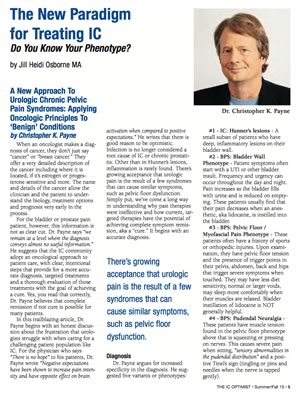Five Proposed Subtypes Help Patients Prioritize Treatments & Self-Care
Did you know that there is tremendous variation in the IC patient population? Some patients have profoundly damaged bladders while others have normal bladders yet both struggle with symptoms of frequency, urgency and pain. Up to this point, both would be diagnosed with IC in in the USA but clearly they are not the same condition. Some patients have a lot of related conditions such as IBS, vulvodynia, prostatodynia while others have none. A large percentage of patients also have pelvic floor muscle dysfunction.
IC is no longer considered a “bladder disease.” We now consider it a “pelvic pain syndrome” because of the symptoms that often occur beyond the bladder. To help understand those variations, researchers have spent the last few years trying to develop clear subtypes of IC. Dr. Dan Shoskes and Dr. Curtis Nickel proposed the UPOINT system which asks physicians to assess not only bladder symptoms and condition but also the muscles, the presence of related conditions, UTI, etc. The MAPP Research Network suggests that atleast two subtypes are present: Hunner’s lesions & non-Hunner’s lesion patients. I believe that Dr. Christopher Payne’s five proposed subtypes released last year represent the complex and often unique patient population best. His system can help patients look at their symptoms with a new, fresh perspective and, perhaps, may explain why some therapies have not worked.
In this video, I explain his five subtypes and why I think they represent the future of IC diagnosis and care! After watching it, I hope you’ll be able to figure out your subtype! What do you think? Did he nail it??
Download The Article

The New Paradigm for IC/BPS – Five Subtypes
ICN Living With IC Video Series
The ICN “Living With IC” Video series has been viewed more than 500,000 times by patients and family members. From basic tips on diet to the last IC research, our goal is to provide clear information in a hopeful and encouraging manner. We want patients to remember that they are not alone. There is always hope!
If you have any topics that you would like to see covered, please send us an email! We’d love to hear your ideas, thoughts and feedback on these videos!

